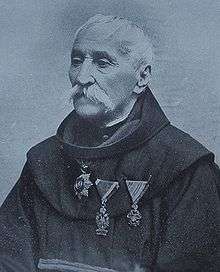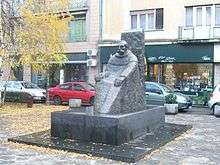Grgo Martić


Fra Grgo Martić (1822 – 30 August 1905), also known as Grga or Mato Martić, was a Bosnian Croat friar and writer from Herzegovina.
Martić was born in Rastovača village near Posušje, Eyalet of Bosnia, Ottoman Empire and was educated in Zagreb and Pest. He was ordained on Christmas Day, 1844. He served for three years in Kreševo and Osova.
From 1851-79 he served as a parish priest in Sarajevo. He performed the majority of his life's work in Bosnia, in the Franciscan monastery in Kreševo.[1][2][3]
In his early life Martić was a nationalist and romanticist, before switching to a more moderate view.[4] In 1842 he wrote that the language of Herzegovina is a dialect of Serbian; he also wrote "Prođimo se kojekakvih mješarija, nego Srbin Srbima srpski srpstvujmo".[5]
Martić worked as a writer and translator, translating works by Homer and Goethe into the Croatian language. At the time of the Austro-Hungarian occupation of Bosnia and Herzegovina, he was politically active on behalf of the Roman Catholic Croats of Bosnia and Herzegovina. In his youth he was a supporter of Illyrian movement.[1][2] Later he became a supporter of the unification of Bosnia & Herzegovina with Croatia. He opened a school in Kreševo in 1847 and a gymnasium in Sarajevo. His best-known literary work was Osvetnici, an epic about the struggle against Ottoman rule.
Martić made contributions to Albanian culture. While Albanian writer Gjergj Fishta attended Franciscan schools in Bosnia, he met with Martić and Croatian writer Silvije Strahimir Kranjčević, who at that time lived in Bosnia. Martić and Kranjčević have been credited with encouraging and inspiring Fishta.[6]
A monument in his honor stands in front of a church in Posušje. The monument holds an open book in which is inscribed: "Teško domu bez ljubavi bratske, ko i Bosni bez zemlje Hrvatske." ("It is a difficult home without brotherhood, whether Bosnia or Croatia").
A commemorative stone cross with a plaque stands in the village Rastovača noting his birthplace, his life and his work. His life has also been commemorated with a postage stamp from Bosnia and Herzegovina.[7]
Literary works
- Slavodobitnica svijetlomu gospodaru Omer-paši (epic poem, 1852)
- Narodne pjesme bosanske i hercegovačke (with Ivan Frano Jukić), I (1858)
- Osvetnici, I-III (ep, 1861/65.), IV (1878.), V (1881.), VI (1881.), VII (1883)
- Početni zemljopis za katoličke učionice u Bosni (epic poem, 1884)
- Narodne pjesme o boju na Kosovu godine 1389 (1886)
- Obrana Biograda godine 1456 (ep, 1887)
- Pjesnička djela fra Grge Martića, 1-7 (1888)
- Pjesnička djela fra Grge Martića, I (1893)
- Zapamćenja/1829-1878, po kazivanju autorovu zabilježio janko Koharić (1906.)
- Izabrani spisi (1956)
References
- 1 2 "Fra Grgo Martić (1822-1905) biodata" (in Croatian). Retrieved 16 March 2009.
- 1 2 "Biography: O fra Grgi Martiću" (in Croatian). Archived from the original on 19 May 2009. Retrieved 16 March 2009.
- ↑ "Biography: Fra Grgo Martić" (in Croatian). Retrieved 16 March 2009.
- ↑ Slavko, Harni, (16 April 2009). "Bibliografski rad Ivana Franje Jukića i kraj kulturne povijesti. Bibliografije kao izvor za povijest knjige i kulturnu povijest". vol 1 (issue 1).
- ↑ Novak, V. Magnum Tempus, p. 282
- ↑ Pater Gjergj Fishta (1871-1940), slideshare.net; accessed 24 October 2016.
- ↑ "STAMP: Father Grgo Martić". Archived from the original on 6 July 2011. Retrieved 16 March 2009.